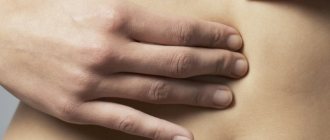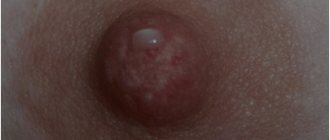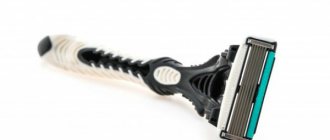26.12.2019
A small amount of vaginal discharge is normal for a healthy adult woman. During the menstrual cycle, discharge may change color, volume, thickness and smell. Therefore, usually white plaque on the genitals of women does not require treatment. You should be wary if:
- the discharge has sharply changed color, acquired an unpleasant odor, and contains inclusions of pus;
- the mucous membranes and skin of the external genital organs become red and swollen, rashes and sores appear on them;
- suffer from pain in the lower abdomen, itching and burning when urinating.
Such symptoms are characteristic of allergic reactions, fungal and bacterial infections of the genital organs. Only a doctor can determine the cause of the disorder and select a treatment program.
Causes of dry labia
The appearance of vaginal discomfort is mainly associated with hormonal changes in the body.
Thus, a deficiency of the female sex hormones estrogen leads to a decrease in the production of natural secretions and disruption of the acidity level of the mucous membrane.
Dryness and burning in the intimate area when wearing trousers
The most common situations when a woman faces this problem:
- Pregnancy and postpartum period. The period of gestation is characterized by significant changes in hormonal levels, which affects the microflora of the vagina. The appearance of dryness and itching of the labia during pregnancy is fraught with scratching and the formation of abrasions, into which pathogenic microorganisms can enter. This is especially dangerous given the woman's position and the possibility of infection of the fetus. Therefore, if severe dryness of the labia and vagina occurs during pregnancy, you should definitely tell your doctor about these symptoms;
- Taking certain medications that reduce estrogen production (antihistamines, oral contraceptives, drugs to lower blood pressure, etc.);
- Menopause. Vaginal discomfort during menopause in women is also associated with hormonal changes. Estrogen deficiency leads to changes in the mucous membrane and loss of its elasticity, and local immunity decreases.
Why does vaginal dryness occur?
Causes of vaginal dryness also include:
- Use of products unsuitable for daily intimate hygiene (regular shower gels, soap). Washing gels for intimate care, as a rule, have a pH level corresponding to the physiological acid-base level of the genital organs, which allows maintaining the natural balance of the vaginal microflora;
- Leukoplakia. This is a disease that is characterized by a change in the upper layer of the epithelium of the cervix (hardening or keratinization) and is accompanied by itching, dryness and burning in the vaginal area;
- Frequent douching. This procedure can lead to dysbacteriosis, dryness, redness and peeling of the labia;
- Smoking and alcohol abuse. Alcohol and tobacco affect hormone production, which can lead to dryness and irritation of the labia majora and minora.
- Surgical interventions;
- Stress and depression. Unresolved stressful situations and prolonged depression lead to increased production of the hormone cortisol.
How can you get rid of unpleasant sensations in the intimate area and what should you use to smear your labia when they are dry? To solve this problem, the Intimate Moisturizing Gel GINOCOMFORT is well suited. It was developed by specialists from the pharmaceutical company VERTEX and is used to eliminate vaginal discomfort caused by hormonal changes. This product has undergone clinical studies conducted at the Department of Dermatovenereology with the clinic of the First St. Petersburg State Medical University under the leadership of Ignatovsky A.V. and Sokolovsky E.V. Testing of the product has shown that it has a soft and delicate effect on the mucous membrane, replenishing the lack of natural lubrication. The natural components of the gel help relieve inflammation, have a healing effect and prevent the occurrence of microcracks and abrasions. The product has the necessary documents and quality certificates.
Dryness in the intimate area during menopause
There are quite effective folk remedies for treating this disease - various herbal infusions and baths. But the main thing to remember is that any alarming symptom is a reason to visit a specialist. Only after examination and study of tests is it possible to diagnose the cause and prescribe adequate treatment.
Thrush
One of the most common causes of white plaque on the genitals in women is thrush, or candidiasis. The causative agents of this disease are fungi, which begin to actively multiply when local and general immunity decreases. The disease can be triggered by an unhealthy lifestyle, stress, STIs, hormonal imbalances and some other factors. To diagnose thrush, the doctor prescribes a flora smear. Treatment usually includes topical and oral antifungals. To strengthen the immune system, vitamin and mineral complexes can be additionally prescribed.
Unpleasant sensations in intimate areas, video
Gynecologist Irina Garyaeva about vaginal dryness.
Source - KVD - dermatovenerological dispensary Sources:
- THERAPY OF UROGENITAL DISORDERS CAUSED BY ESTROGEN DEFICIENCY. Serov V.N. // Obstetrics, gynecology and reproduction. – 2010. – No. 1. – P. 21-35.
- PROBLEMS OF UROGENITAL DYSTROPHY IN WOMEN OF REPRODUCTIVE AND PERIMENOPAUSAL AGE. Karahalis L.Yu. // Kuban Scientific Medical Bulletin. – 2007.
- Features of urogenital disorders in perimenopause. Balan V. E., Ankirskaya A. S., Muravyova V. V., Tikhomirova E. V. // Materials of the V Russian Forum “Mother and Child”. - 2003. - P. 290.
- The overactive bladder. Bulmer P., Abrams P. // Rev Contemp Pharmocother. – 2000. – No. 11. R. 1–11.
- Characteristics of hot flashes in women of different age groups. Karahalis L. Yu., Fedorovich O. K. // AG-info. - 2006. - No. 2. - P. 26–31.
- https://www.verywellhealth.com/natural-remedies-for-vaginal-dryness-90070
- https://www.healthline.com/health/vaginal-itching
- https://www.medicalnewstoday.com/articles/321615.php
- https://www.webmd.com/women/guide/vaginal-dryness-causes-moisturizing-treatments#1
Sexually transmitted diseases
Peeling skin is a common symptom of sexually transmitted infections. In addition to it, women will also have other symptoms: itching, swelling, vaginal discharge, and unpleasant odor.
Sexually transmitted diseases that cause peeling include the following:
- Chlamydia is a pathology caused by chlamydia bacteria. The genitals peel and swell. The discharge becomes profuse and yellow in color. The general symptoms resemble the clinical picture of vulvovaginitis or urethritis.
- Genital herpes is a disease caused by the herpes virus type 2. Bubbles with clear or cloudy liquid appear on the genitals, and the skin peels off. The disease is accompanied by severe itching and burning.
- Trichomoniasis is a sexually transmitted infection during which inflammation of the genitourinary system occurs. In addition to peeling on the labia minora and vagina, there is heavy discharge and burning of the labia.
- Ureaplasmosis is a sexually transmitted disease, but usually does not manifest itself. When immunity decreases, clear discharge and pain during urination begin.
- Gardnerellosis is a type of bacterial vaginosis. When sick, a woman's genitals emit a strong smell of rotten fish. Green or yellow vaginal discharge. In an advanced state, the disease leads to cystitis or pyelonephritis.
Sexually transmitted diseases are caused by bacteria. Treatment is carried out with a course of antibiotics. Home methods are powerless in the fight against sexually transmitted diseases.
Popular questions
I am concerned about dryness and slight itching in the vagina.
Which Gynocomfort is better to use: calming or restorative? To eliminate dryness and itching, Ginocomfort moisturizing gel with mallow extract is better suited. The gel is used in 1 dose 1 time per day for 7-14 days.
For six months now I have had dry vulva, white thick discharge, like kefir, with a bitter or sour odor, and lack of lubrication during sex. It seems like all the symptoms of thrush, but my smears are clean. I rented it out several times. The mucous membrane became very sensitive in the morning. Even if you lubricate it with Ginocomfort gel, the entire surface burns. It's like it was scratched there. From March to January I took the COC Yarina+, but then stopped because... I thought it was a side effect.
Please tell me how can I find out the cause of this condition? You need to conduct a more expanded set of examinations: PCR for STIs (for example, femoflor screening), culture for nonspecific microflora, smear analysis for oncocytology. The results will help not only assess the balance of microflora, but also the degree of hormonal saturation, which is also important in ensuring hydration and elasticity of the mucous membranes.
Good afternoon The doctor prescribed Gynocomfort because of vaginal dryness (I have been taking OK for a long time), I use a gel with mallow extract. When using it, I experience pain, burning and itching, but after a short period of time everything returns to normal, the sensations are good. But I have been using it for more than one week, and the itching and burning is still there. And my young man, after using the gel as a lubricant, developed a cheesy coating and redness. What could it be? Tests for thrush, STIs and HPV are negative. I have vaginitis, I take a course of “Genferon” (5 days for 3 cycles after menstruation), but I use “Gynocomfort”
separately from him. Is pain and burning normal when using this gel? Do I need to stop using Gynocomfort? Hello! If the complaints you describe quickly stop and do not cause further inconvenience, then you should continue using the gel. This is the reaction of the mucous membranes to the onset of the gel’s action. After contact, the partner should take hygienic measures, since the white coating is the result of the interaction of the gel with the contents of the genital tract.
Good afternoon I feel dryness, burning and itching in the vagina; I was previously treated for thrush. I am 44 years old, 8 mm epithelium, uterine fibroids.
Hello!
After anti-inflammatory therapy, an important step is to restore the pH of the environment in the genital tract and lactoflora, which maintains the elasticity of the mucous membranes and hydration. I recommend using Gynocomfort gel with tea tree oil for 7-10 days, 1 dose once a day. For an accurate diagnosis, contact a specialist
Vulvitis
An unpleasant-smelling plaque on the labia can also be a sign of vulvitis or vulvovaginitis - inflammation of the skin and mucous membranes of the external genitalia. The development of the disease can be triggered by:
- neglect of the rules of intimate hygiene,
- allergies to synthetic underwear, shower gels,
- imbalance of microflora - vulvitis is a common complication of antibiotic therapy,
- decreased immunity,
- infection with STIs,
- active reproduction of opportunistic flora - often begins against the background of stress, dysbacteriosis, and immunodeficiency.
A comprehensive diagnosis of vulvitis includes a gynecological examination, bacterioscopy of discharge, and blood tests for infections. Based on the test results, the specialist develops a treatment program.
Symptoms
As a rule, peeling skin on the penis is not the only sign of problems in the body. The symptom is often accompanied by:
- irritation and itching,
- an increase in local and general temperature,
- redness of the skin,
- pathological discharge from the urethra,
- the appearance of wounds or skin blisters,
- the appearance of cracks and excessive dryness,
- pain in the genital area,
- swelling of the inguinal lymph nodes.
If a man experiences the above symptoms or the skin on the penis peels off for a long time, he should definitely consult a doctor. Only a doctor can make a correct diagnosis after a comprehensive diagnosis.
Treatment
Therapy methods are selected taking into account the cause of the pathology:
- antihistamines are prescribed for an allergic reaction;
- antibiotics are prescribed in case of sexually transmitted diseases;
- antifungal agents must be taken for candidiasis;
- vitamins are required in case of vitamin deficiency.
Additionally, the doctor may prescribe anti-inflammatory drugs. They will relieve swelling and relieve pain. Local agents – antibacterial ointments and gels – also demonstrate high effectiveness. They are also used to improve a man's overall well-being.
Is the skin on your penis peeling? Come to our clinic. Experienced doctors will make a diagnosis and select the optimal treatment method. Make an appointment with a urologist in Moscow by phone.
Other causes of peeling
- Vitamin deficiency - when there is a lack of vitamins, the skin, nails, and hair suffer. The delicate mucous membranes of the genital organs also become thinner. The labia become covered with microcracks, and the skin begins to peel off. Vitamin deficiency most often affects women in the spring, when fresh vegetables and fruits are not yet ripe, and last year’s have lost most of their nutrients. Sometimes peeling occurs when there is a deficiency of protein foods (meat, eggs, dairy products).
- Stress – with constant nervous tension, metabolism deteriorates, which negatively affects the functioning of the entire body. Often the labia peel off and the entire vaginal mucosa suffers.
- Thrush – vaginal candidiasis is caused by Candida fungi. They live in the body of every person, but with weakened immunity they begin to actively reproduce. Vaginal candidiasis has distinct symptoms. Women experience abundant cheesy discharge, and the genitals are very itchy and itchy. The skin on the lips swells and peels.
- Menopause - hormonal changes occur during this period. The body lacks the hormone estrogen, which is why women feel dryness in the genitals, the mucous membrane cracks, and possibly peeling of the skin.
- Pubic lice or subcutaneous mites - insects often settle in the groin area. They bite the carrier, causing itching and burning. The skin peels and swells in places. Parasites can be detected by self-examination of the genitals.
How is peeling treated?
The treatment regimen for women depends on the disease and what pathogens it is caused by. If it is caused by bacteria, then antibiotics are used; if it is caused by viruses, then antiviral drugs are used. For fungal infections, antimycotic agents are used.
- Sexually transmitted diseases are treated with antibiotics. The duration depends on the degree and form of the disease. Usually the drugs are injected intramuscularly. Antibiotics of the penicillin, cephalosporin or macrolide series are considered the most common and effective.
- For thrush, antifungal drugs are used: Nystatin, Fluconazole. It is advisable to take a course of vaginal suppositories, which will relieve local inflammation. Among them are Diflucan or Flucostat.
- If peeling is caused by allergies, then antihistamines will help: Zodac or Zyrtec.
- For genital herpes, antiviral drugs are used that fight the herpes virus. The most effective are Acyclovir and Zovirax.
During treatment of diseases, you should take a course of vitamins and sedatives. It is also worth maintaining sexual rest and maintaining a healthy lifestyle.
Conclusion
Peeling of the labia occurs for various reasons. These may include sexually transmitted diseases, stress, thrush, and menopause. Sometimes it is caused by extraneous causes that are safe for health (wearing tight underwear or an allergy to condoms).
If peeling does not go away on its own within a few days or is accompanied by other signs, then women should seek help from a gynecologist.









